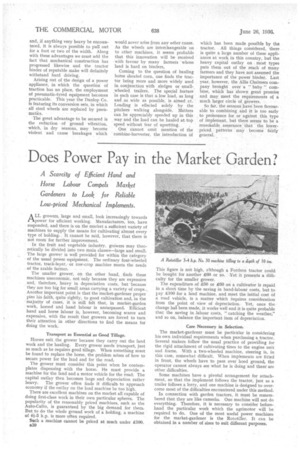Does Power Pay in the Market Garden?
Page 72

If you've noticed an error in this article please click here to report it so we can fix it.
A Scarcity of Efficient Hand and Horse Labour Compels Market Gardeners to Look for Reliable Low-priced Mechanical Implements.
ALL growers, large and small, look increasingly towards .power for efficient working. Manufacturers, too, have responded, and there is on the market a sufficient variety of machines to supply the means for cultivating almost every
• type of holding.. It cannot be said, however, that there is not room for further improvement.
In the fruit and vegetable industry, growers may theoretically be divided into two main classes—large and small. The large grower is well provided for within the category of the usual power. equipment. The 'ordinary four-wheeled tractor, track-layer,or row-crop machine meets the needs . of the arable farmer.
The smaller grower, on the other hand, finds these machines uneconomic, not only because they are expensive and, therefore, heavy in depreciation costs, but 'because they are too big for small areas carrying a variety of crops., Another important point is that the market-gardener proper pins his faith, quite rightly, to good cultivation and, in the majority of cases, it is still felt that, in market-garden work, horsed and hand labour is unsurpassed. Efficient hand and horse labour is, however, becoming scarce and expensive, with the result that growers are forced to turn their attention in other directions to find the means for doing the work.
Transport as Essential as Good Tillage.
Horses suit the grower because they carry out the land work and the hauling. Every grower needs transport, just as much as he requires good tillage. When something must be found to replace the horse, the problem arises of how to secure power for the land and for the road.
The grower must consider this point when he contemplates dispensing with the horse. He must provide a machine for the land and a motor vehicle for the road. The capital outlay then becomes large and depreciation rather heavy. The grower often finds it difficult to approach economy if the outlay on the land machine be too high.
There are excellent machines on the market all capable of doing first-class work in their own particular spheres. The popularity of the reasonably priced machines, such as the Auto-Culto, is guaranteed by the big demand for them. But to do the whole ground work of a holding, a machine of 4i.-5 h.p. is more often required.
Such a machine cannot be priced at much under £100. e30
This figure is not high, although a Fordson tractor could be bought for another £60 or so. Yet it presents a difficulty for the smaller grower.
The expenditure .of £50 or £60 on a cultivator is repaid in a short time by the saving in hand-labour costs, but to pay 4100 for a land machine, and meet the initial cost of a road vehicle, is a matter which requires consideration from the point of view of depreciation. Yet, once the change hag been made, it works well and it is quite probable that the saving in labour costs, " catching the weather," and so on, balance the important item of depreciation.
Care Necessary in Selection.
The market-gardener must be particular in considering his own individual requirements when purchasing a tractor. Several makers follow the usual practice of providing for the rigid attachment of cultivating tines to the engine unit and frame. •With a two-wheeled machine, steering is, in this case, somewhat difficult. When implements are fitted in front, the wheels have to pass over hoed ground, the operator cannot always see what he is doing and there' are other difficulties.
Some machines have a pivotal arrangement for attachment, so that the implement follows the tractor, just as a trailer follows a lorry, and one machine is designed to overcome most of the difficulties encountered under this method.
In connection with garden tractors, it must be remembered that they are like cameras. One machine will not do everything. Therefore, it is necessary to consider beforehand the particular work which the agrimotor will be required to do. One of the most useful power machines for the market-gardener is the Rototiller. It can be obtained in a number of sizes to suit different purposes,












































































































































